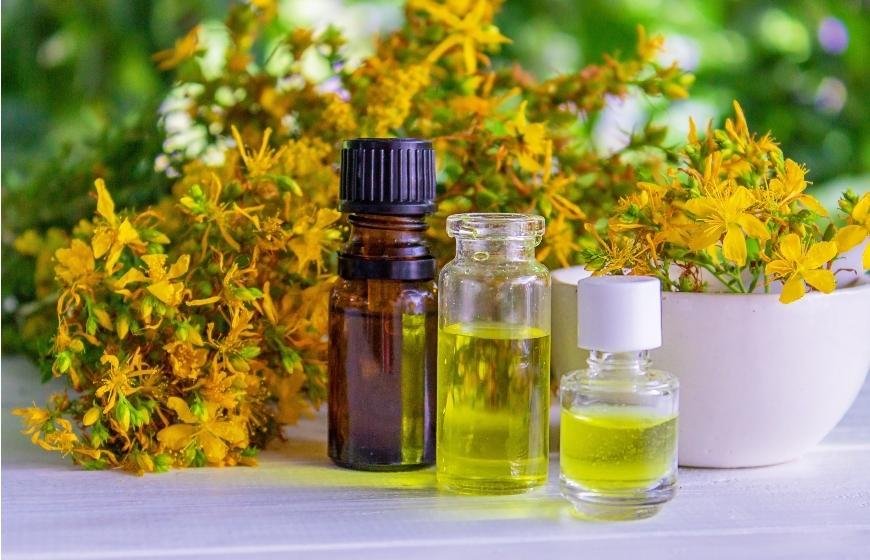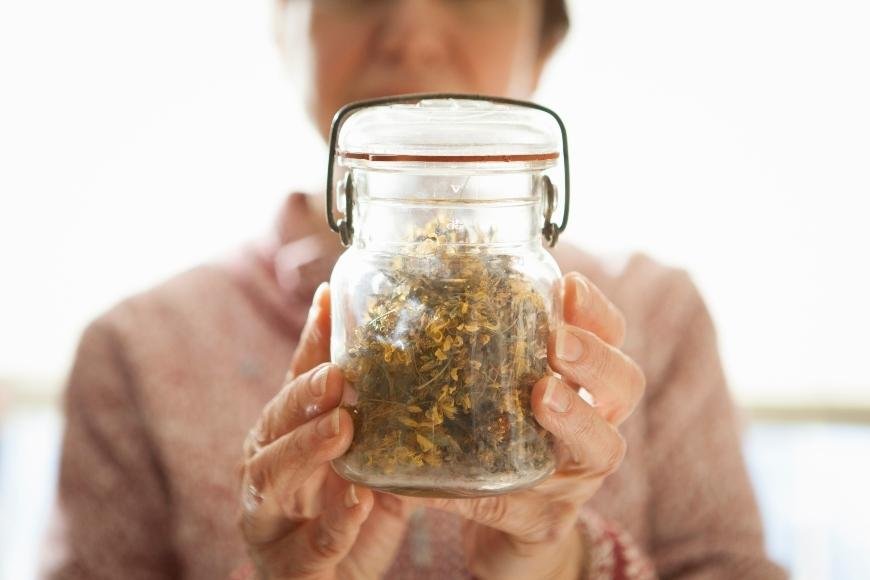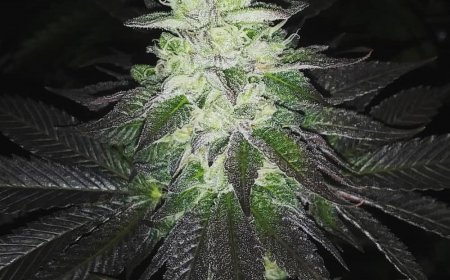What is St John's Worth?
Explore "What is St John's Worth" in this article covering its history, active compounds, effects, side effects and safety for young adults.

If you've ever wondered "What is St John's Wort?", you're in for a treat. This fascinating plant has been used throughout history for its various properties and effects on the human body. In this blog post, we will dive deep into the world of St John's Wort, exploring its rich history and uncovering the secrets behind its active compounds.
Continuing our exploration, we'll evaluate the potential benefits and side effects of St John's Wort, as well as its interactions with other substances to ensure informed decisions. Additionally, we'll delve into possible interactions with other substances to ensure that you have all the information needed before considering using this intriguing herb.
Table of Contents:
- What is St John's Wort?
- Ancient Origins and Traditional Uses
- History of St John's Wort
- Active Compounds in St John's Wort
- Effects of St John's Wort
- Side Effects of St John's Wort
- Is St John's Wort Safe?
- St John's Wort Interactions
- Frequently Asked Questions What is St John's Worth
- Conclusion
What is St John's Wort?

St John's Wort, scientifically known as Hypericum perforatum, is a perennial flowering plant native to Europe and Asia. St John's Wort has long been utilized for its medicinal properties, and in recent times it has become a favorite herbal supplement among young adults seeking natural remedies. This versatile herb boasts bright yellow flowers that typically bloom around the summer solstice, which coincides with the feast day of St. John the Baptist - hence its name.
Ancient Greeks held the belief that St John's Wort possessed magical abilities, able to protect from malicious spirits. Today, this fascinating plant continues to capture the interest of those looking for alternative treatments in an increasingly health-conscious world.
Ancient Origins and Traditional Uses
In addition to its mystical associations, St John's Wort has long been valued for its therapeutic benefits. The famous Greek physician Hippocrates was one of the first to document its medicinal uses over 2000 years ago (source). Since then, it has been utilized by various cultures across time:
- Roman Empire: Ancient Romans employed this herb as a remedy against snakebites and other poisonous creatures.
- Middle Ages: European folk healers prescribed it as an all-purpose treatment for wounds, burns, bruises, nerve pain and even depression.
- Nineteenth Century America: Physicians listed it in their pharmacopoeias (official drug lists) as an effective solution against nervous disorders such as anxiety or melancholia (source).
In modern times, St John's Wort remains a popular choice for those seeking natural alternatives to pharmaceuticals. Its most well-known application is as an herbal antidepressant, although it has also been studied for its potential in treating various other conditions.
St John's Wort, a potent medicinal herb with centuries of application in treating numerous ailments, remains a fundamental element of contemporary medicine. Given its longstanding reputation and potential health advantages, it's not shocking that St John's Wort is still an integral component of modern-day medicine. Now let us take a look at the history of this amazing plant and how it came into use.
History of St John's Wort
The history of St John's Wort, also known as Hypericum perforatum, dates back thousands of years. This yellow-flowered plant has been used for its medicinal properties by various cultures throughout time. In this article, we will explore the past and traditional applications of Hypericum perforatum (St John's Wort).
Ancient Greece and Rome
In ancient times, Greek healers like Hippocrates and Dioscorides noted the application of St John's Wort to address issues such as snakebites, burns, injuries, and despondency. The Roman naturalist Pliny the Elder also mentioned it in his writings (source). These early civilizations believed that the plant had mystical powers to ward off evil spirits.
Medieval Europe
In medieval Europe, St John's Wort was named after Saint John the Baptist because its bright yellow flowers typically bloom around his feast day on June 24th. It was believed to have protective qualities against witchcraft and evil spirits during this period. Monks often used it in their monasteries for medicinal purposes like treating wounds or easing anxiety.
Nineteenth Century America
During the nineteenth century in America, herbalists began using St John’s Wort more extensively due to its effectiveness in treating a variety of conditions such as nervous disorders and inflammation. It became a popular remedy among settlers who relied on local plants for medicine (source).
Active Compounds in St John's Wort
If you're curious about the inner workings of St John's Wort, it all comes down to its active compounds. These naturally occurring chemicals are responsible for the plant's various effects on our bodies and minds. Let's dive into some of these key components:
Hypericin and Pseudohypericin
The most well-known active compounds found in St John's Wort are hypericin and pseudohypericin, which belong to a group called naphthodianthrones. They have been extensively studied for their potential antidepressant properties, with some research suggesting that they may help increase serotonin levels in the brain - a neurotransmitter often associated with feelings of happiness and well-being.
Hyperforin
Besides hypericin, another important compound present in St John's Wort is hyperforin - a prenylated phloroglucinol derivative known for its potent antibacterial activity against Gram-positive bacteria such as Staphylococcus aureus. Hyperforin has also been shown to inhibit the reuptake of several neurotransmitters like serotonin, dopamine, noradrenaline, GABA (gamma-aminobutyric acid), and glutamate - contributing significantly to the herb's overall therapeutic effect on depression. For an overview of recent findings regarding hyperforins' pharmacological actions, take a look at this comprehensive research article.
Flavonoids
St John's Wort also contains a variety of flavonoids, which are natural antioxidants that can help protect our cells from damage caused by free radicals. Some examples of these flavonoids include quercetin, rutin, and kaempferol. These compounds have been studied for their potential anti-inflammatory and neuroprotective properties - offering additional health benefits alongside the mood-enhancing effects of hypericin and hyperforin.
- Quercetin: A powerful antioxidant with anti-inflammatory properties that may help reduce symptoms associated with allergies or asthma.
- Rutin: Another antioxidant compound known to strengthen blood vessels and improve circulation.
- Kaempferol: A flavonoid believed to possess anticancer, anti-inflammatory, and cardioprotective properties.
In summary, St John's Wort is packed with an array of active compounds like hypericin, pseudohypericin, hyperforin, and various flavonoids - each contributing uniquely to the plants therapeutic profile. Understanding these components helps us appreciate how this ancient herb continues to captivate modern-day psychonauts seeking alternative remedies for mental well-being.
Effects of St John's Wort
If you're looking for a natural way to improve your mood and mental well-being, St John's Wort might be the answer. St John's Wort has been used for centuries to treat a variety of ailments, but it is best known for its potential antidepressant effects. In this section, we'll explore the different ways that St John's Wort can affect your mind and body.
Mood-Boosting Properties
One of the primary reasons people turn to St John's Wort is because of its mood-enhancing properties. The active compounds in this plant are believed to help increase serotonin levels in the brain, which can lead to an improved sense of well-being and happiness. Studies have demonstrated that St John's Wort can be just as efficacious as certain prescription antidepressants in treating mild-to-moderate depression.
Anxiety Relief
In addition to its potential benefits for depression, St John's Wort has also been suggested as a possible aid in relieving anxiety. Studies suggest that St John's Wort may help alleviate symptoms of anxiety disorders such as GAD and social phobia.
Sleep Improvement
If you struggle with insomnia or other sleep-related issues, incorporating St Johns wort into your routine might provide some relief. Some users report experiencing better sleep quality after using this herb regularly due to its calming effect on the nervous system.
Natural Pain Relief
- Neuropathic pain: St John's Wort has been found to be effective in treating neuropathic pain, which is often caused by nerve damage or dysfunction. This makes it a potential option for those suffering from conditions like diabetic neuropathy or sciatica.
- Muscle and joint pain: The anti-inflammatory properties of this herb may also help alleviate muscle and joint discomfort associated with arthritis, fibromyalgia, or other inflammatory conditions.
It is critical to be conscious of the potential consequences prior to utilizing this herbal supplement, as reactions may differ from one person to another. As such, the next heading will focus on what those possible side effects are and how they might affect an individual who chooses to take St John's Wort.
Side Effects of St John's Wort

Before taking St John's Wort, it is important to be aware of any potential side effects that may arise. While many people experience positive results with this supplement, some individuals may encounter adverse reactions. In this section, we'll explore the potential side effects associated with St John's Wort, both common and rare.
Common Side Effects
Most users report mild side effects when using St John's Wort. Some common ones include:
- Dry mouth
- Dizziness
- Fatigue or drowsiness
- Gastrointestinal symptoms (nausea, diarrhea)
- Sensitivity to sunlight (photosensitivity)
Rare but Serious Side Effects
In rare cases, more severe side effects can occur while taking St John’s Worth:
- Serotonin Syndrome: This is a potentially life-threatening condition caused by excessive serotonin levels in the brain. It usually occurs when combining multiple medications or supplements that increase serotonin levels. Symptoms include agitation, confusion, rapid heart rate. If you suspect serotonin syndrome, seek immediate medical attention.
- Allergic Reactions: Though rare, some individuals may experience an allergic reaction to St John's Wort. Symptoms can include rash, difficulty breathing, and swelling of the face or throat. If you think an allergic response is happening, stop taking St John's Wort right away and get medical help.
It is essential to take into account how St John's Wort may interact with other medications or supplements you are taking. We'll explore this topic further in the next section on St John's Wort interactions.
Is St John's Wort Safe?
If you're considering adding St John's Wort to your list of recreational substances, it's important to understand its safety profile. Though often thought of as safe, there are certain risks and considerations to be aware of when taking St John's Wort.
Sun Sensitivity
An interesting aspect of St John's Wort is its ability to increase sensitivity to sunlight in some individuals (source). This means that those who consume the herb might be more prone to sunburns or other skin irritations from UV exposure. To minimize this risk while using the supplement outdoors during sunny days wear sunscreen and protective clothing.
Pregnancy and Breastfeeding Concerns
There isn't enough conclusive evidence about the safety of using St Johns wort during pregnancy or breastfeeding; therefore women in these situations should avoid consuming this plant without consulting their doctor first (source).
Dosage Considerations
- Standardized Extract: A common form available for consumption is standardized extract capsules containing 0.3% hypericin, with a recommended dosage of 300mg taken three times daily.
- Tea: St John's Wort can also be consumed as tea by steeping dried flowers and leaves in hot water for about five minutes. The typical recommendation is to drink one cup, up to three times per day.
It is important to abide by the recommended amounts and seek advice from a medical professional if any worries or queries come up regarding its use.
Risk of Serotonin Syndrome
Serotonin syndrome is a potentially life-threatening condition that occurs when there are high levels of serotonin in the body. This can happen when combining St Johns Wort with other substances that increase serotonin levels such as antidepressants (SSRIs), MDMA (ecstasy), or certain pain medications. To avoid this risk, it's crucial not to mix these substances while using St. Johns Wort.
In conclusion, while St John's Wort has been used safely for centuries by many people around the world, it is important to consider potential risks and interactions before deciding whether it's right for you. Always consult your doctor or another qualified healthcare professional if you're unsure about incorporating this herb into your recreational substance repertoire.
St John's Wort Interactions
When it comes to using herbal supplements like St John's Wort, it is essential to be aware of potential interactions with other drugs and supplements. St John's Wort has been known to interact with various medications, leading to reduced effectiveness or increased side effects.
Potential Drug Interactions
- Antidepressants: Combining St John's Wort with other antidepressants, such as selective serotonin reuptake inhibitors (SSRIs) or monoamine oxidase inhibitors (MAOIs), can lead to a dangerous increase in serotonin levels, causing a condition called serotonin syndrome.
- Blood thinners: The use of St John's Wort alongside blood-thinning medications like warfarin may decrease the drug’s effectiveness and increase the risk of bleeding.
- Hormonal contraceptives: There have been reports that suggest taking St John's Wort while on hormonal birth control methods like pills, patches, or implants might reduce their efficacy and result in unintended pregnancies.
- HIV/AIDS medications: Some studies indicate that this supplement could potentially lower the concentrations of certain antiretroviral drugs used for HIV/AIDS treatment. This interaction may compromise the effectiveness of these vital medicines.
Natural Supplement Interactions
In addition to prescription medication interactions, there are also some natural supplements that should not be combined with St John’s Wort due to possible adverse effects. These include:
- 5-HTP and L-tryptophan: Both of these supplements are precursors to serotonin, and combining them with St John's Wort may increase the risk of developing serotonin syndrome.
- Kava Kava: This herbal supplement is known for its calming effects. However, when taken alongside St John’s Wort, it could potentially cause liver damage due to their combined impact on the organ.
To minimize potential risks associated with drug interactions while using St John's Wort, always consult your healthcare provider before starting any new medication or supplement regimen. It is critical to reveal any medications and supplements you are presently taking - both prescribed and non-prescription - for a secure experience.
Frequently Asked Questions What is St John's Worth
What exactly does St John's Wort do?
St John's Wort, a herbal remedy, is primarily used to treat mild to moderate depression and anxiety. It works by increasing the levels of certain neurotransmitters in the brain, such as serotonin and dopamine, which help regulate mood.
What is St John's wort considered to be?
St John's wort is considered an herbal supplement or alternative medicine for treating various mental health conditions. Although it has been widely used for centuries in traditional medicine practices, its effectiveness varies among individuals.
Why don't doctors prescribe St John's wort?
Doctors may not prescribe St John's wort due to potential interactions with other medications and lack of standardization in dosage. Additionally, its efficacy compared to conventional antidepressants remains inconclusive in clinical trials.
What should you avoid when taking St John's wort?
When taking St Johns Wort, avoid consuming alcohol or recreational drugs that can exacerbate side effects. Be cautious with exposure to sunlight as it may increase sensitivity leading to sunburns. Most importantly, consult your doctor before combining it with any prescription medication due to possible drug interactions.
Conclusion
In conclusion, St John's Wort is a powerful medicinal herb with many benefits and potential side effects. For centuries, St John's Wort has been utilized as a medicinal herb to treat various ailments and is now available in many health stores as an herbal supplement. Although it may have some positive effects on certain conditions, caution should still be taken when using this plant due to its interactions with other medications and the possibility of adverse reactions or side effects. Always check with a medical professional prior to consuming any new drugs or supplements.


































































































































